#conlanging resource
Explore tagged Tumblr posts
Text
Conlanger’s Thesaurus
by William S. Annis
A Conlanger’s Thesaurus is a basic wordlist which has been annotated with notes on common paths of grammaticalization, cross-linguistic polysemy and other information mostly from the work of lexical and semantic typologists. The collection itself isn’t innovative in any way, but rather collects this information in a convenient format. Its intended use is to act as a guard against relexing your native tongue in your conlang.
3 notes
·
View notes
Text
youtube
#mvtjournalist speaks#conlanging#language creation#language construction#glossopoeia#conlanging resource#linguistics#native american languages#native american#Youtube
0 notes
Text
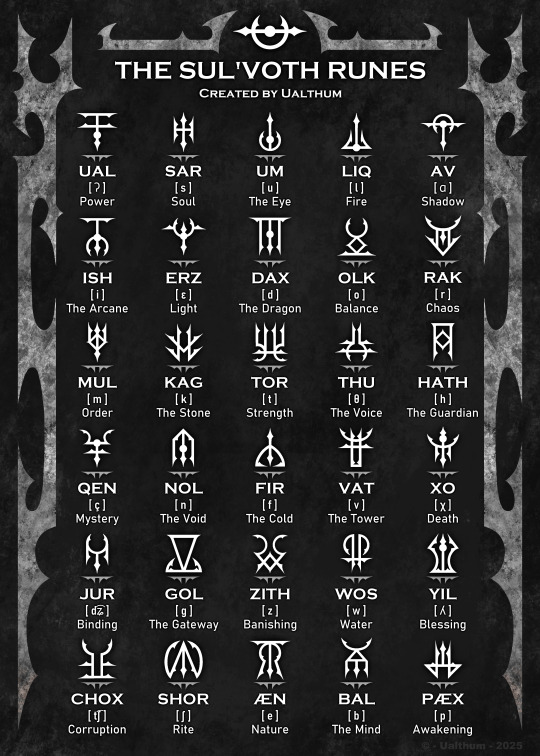
The 10th Anniversary of Sul'voth begins this year! This is the newest and fully complete list of the letters of the language, complete with both phonetic symbols and their primary runic representations. Dark blessings.
#magic#art#occult#sorcery#witchcraft#spirituality#artists on tumblr#runes#occultism#language#linguistics#conlang#sigils#witch#illustration#reference#resource#free
74 notes
·
View notes
Text
was devastated to discover while setting up my new phone that the app I used to use for recording my conlangs no longer exists. But! In an exciting turn of events, I discovered that there is another app that does the same thing – and does it better!
It's called WordTheme. It's free! There's a paid full version but rn the free one seems fine and the adverts are fairly unobtrusive. I don't know if it's available on Apple but if you're on Android & you like making up languages or words for your SFF stories, I definitely recommend checking this out. ooohhhh the options for organisation are making me salivate. To start with, you get your dictionary list:
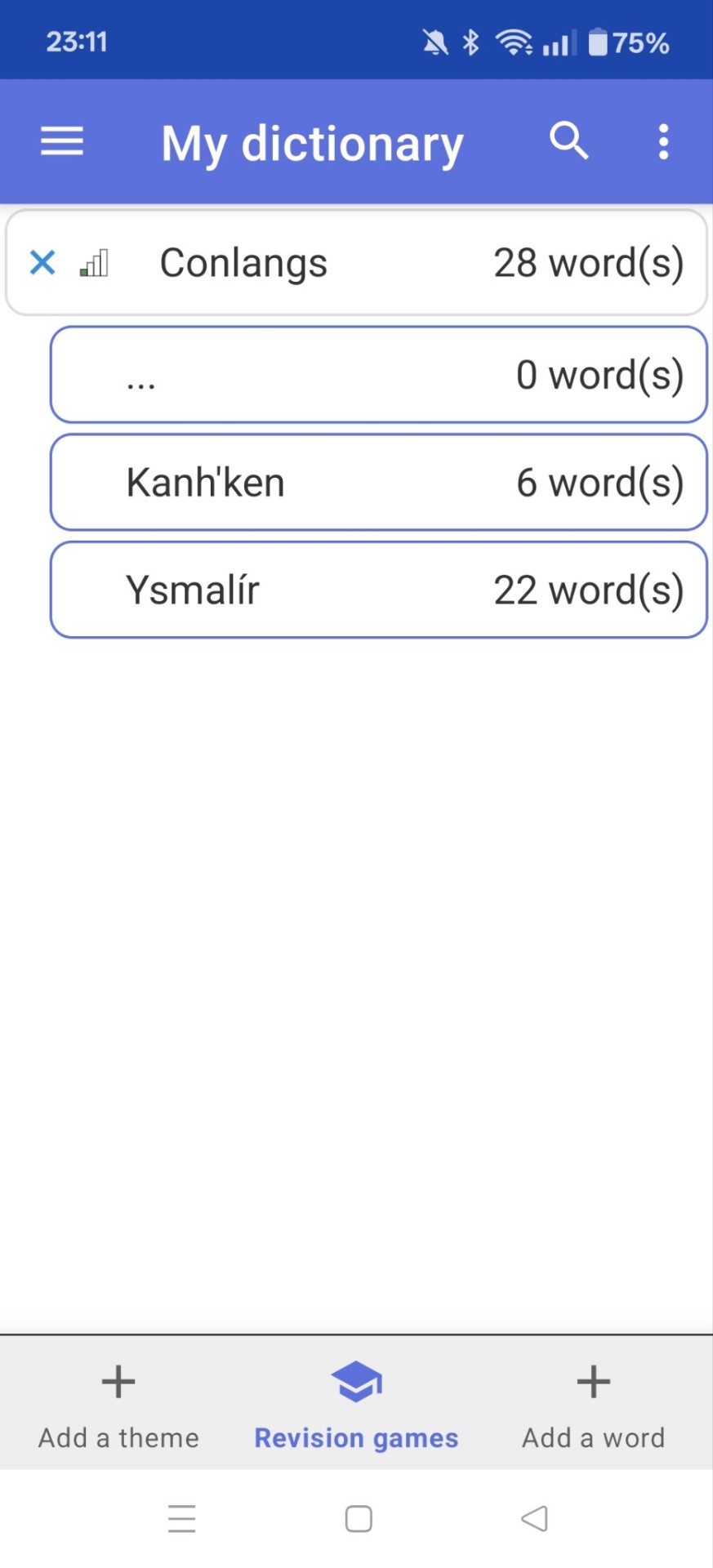
Here you can see I have one dictionary called "Conlangs", with sub-folders for my two invented languages, Ysmalír and Kanh'ken. Clicking on a sub-dictionary shows you an alphabetical list of the words in that dictionary, like so:
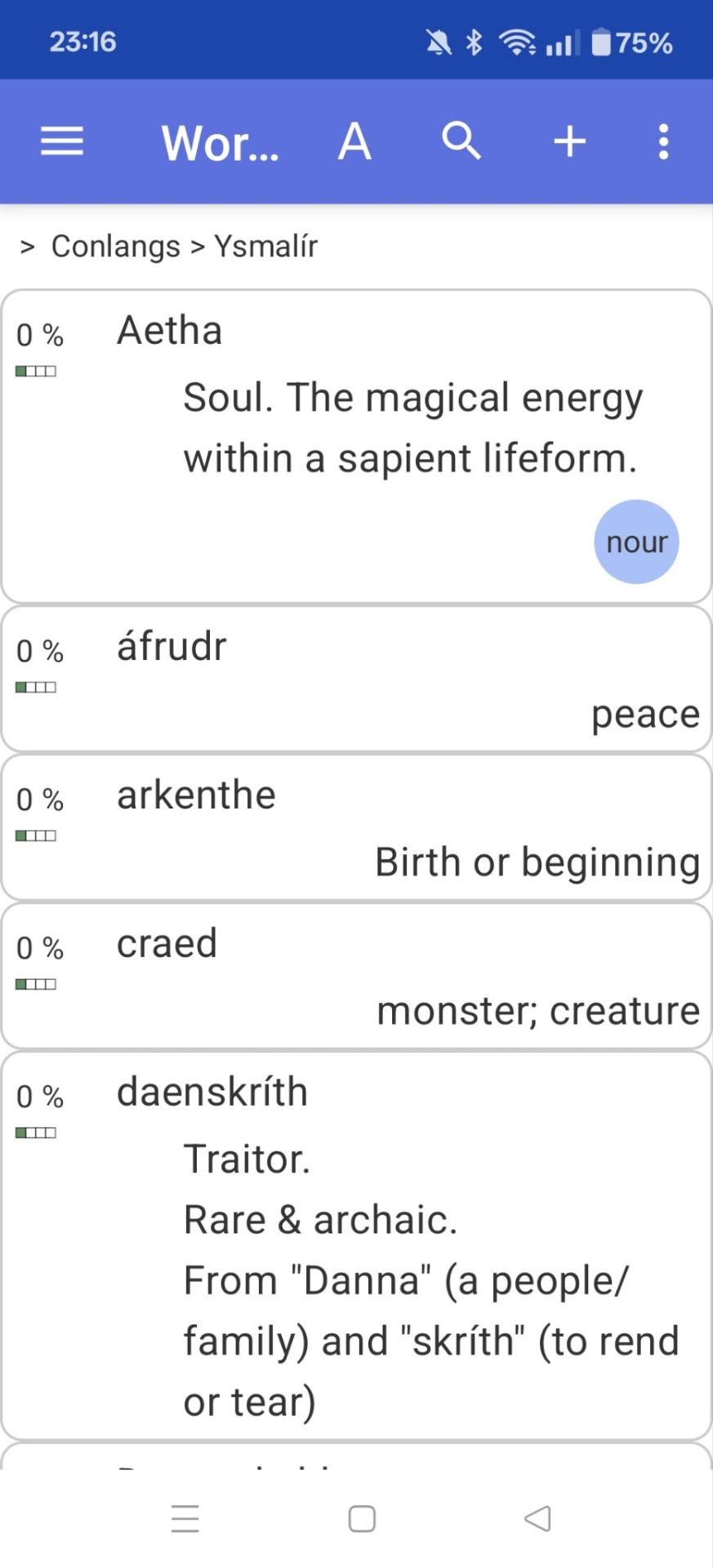
You can add tags to your words to group them by type (one of mine up there is tagged "noun" from where I was figuring the tag system out. I now have tags for animals, endearments, and terms of address & I'm planning to add more, like a tag for insults).
And here's the feature that makes me so so happy: once you've recorded your word and its meaning, you can then click "add details" & you get MORE OPTIONS.
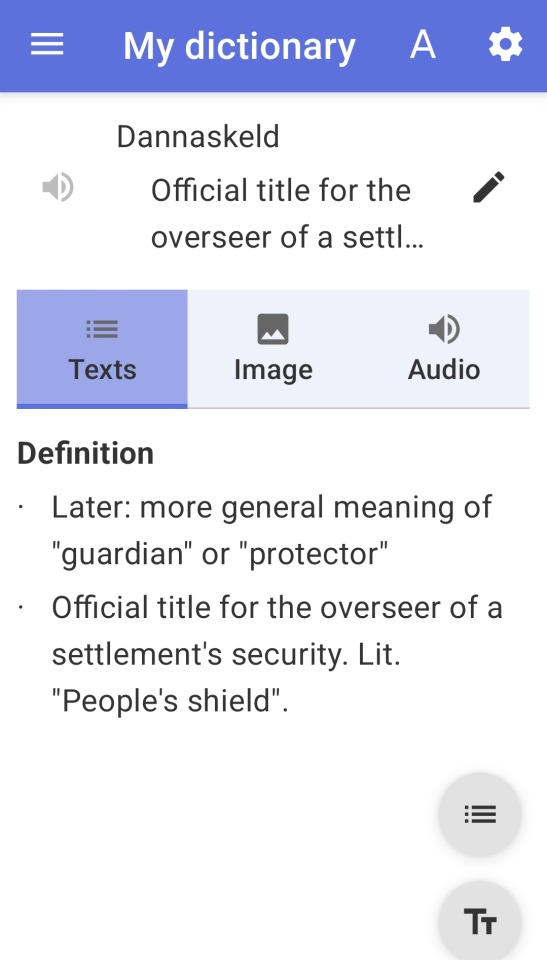
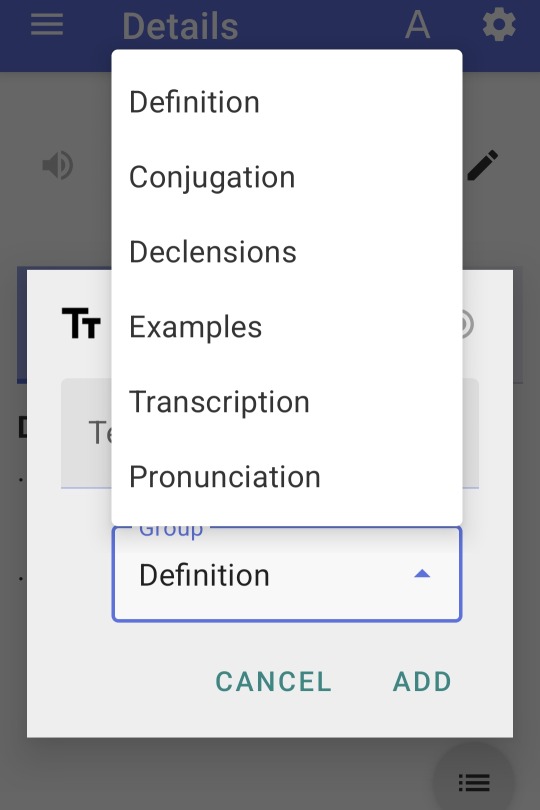
You can add more text under your word's definition, in groups under headings that include examples, definition, declension and pronunciation. Just like an entry in a real dictionary!! You can also add images and audio but I haven't looked at that yet.
The app has features for revising bc it's also intended to help people who are learning real life languages, but as someone with a scraggly haphazard conlang I'm finding it so useful and easy to ignore the extraneous features.
23 notes
·
View notes
Note
Salutations! I recently found your alien world and was instantly hooked by your Chenesht sophonts. The world is captivated - but your conlang truly hooked me. I don't i've EVER seen an alien conlang as fleashed out as yours, and as a nerd of biology (and not linguistics) I have no idea how to start incorporating such a intricate concept into my own world
My question is: what is this Chenesht like? could a human speak it? And most importantly how did you make it and what are your tips & tricks for someone starting their own conlang?
Oh man thank you! Funny enough this isn't even my most fleshed out conlang [that honor belongs to one I made ages ago that will never see the light of day] but I'm exceptionally glad you enjoy it!
Chenesht language is divided into 2 groups, regional and standardized. Regional is an umbrella term used for the several different dialects spoken across the supercontinent, whereas standardized is what's accepted as the 'proper form', ie. what you'd learn out of a textbook. Chenesht isn't 100% pronounceable by humans due to their Ejective Glottal Click consonant [usually romanized as 'CH']. Chenesht make it by exhaling quickly and opening/slamming closed a special set of flaps around their larynx that initially formed for their pre-language pre-sapience mating call. It ends up resonating in their chest/throat, and makes chenesht a shockingly loud spoken language. The closest humans can get is the hard 'k' or the ejective post-alveolar click of Xhosa [represented by q].
The rest of the sounds are nothing special though, and humans can and do easily pick it up!
In terms of overall sound, the closest languages I could point you to are Welsh [due to their 'sh' consonant being identical to the welsh 'll'] and Xhosa [due to the aforementioned clicks], but I'm not sure it resembles any one human language. These are also the human languages Chenesht have the easiest time picking up.
ADVICE SECTION - Making a conlang isn't easy necessarily, but it can be really fun. I always take myself through a small checklist whenever I start one.
1- What sounds could the speaker reasonably produce given their anatomy?
2- How developed does this need to be?
3- What is the 'vibe' of the language?
When I have all of those, I feel comfortable to start. For Chenesht, they can reasonably produce All human sounds + some extra, but I chose to limit myself to their current batch of sounds for the sake of ease. I decided I wanted it to be functional enough to eventually write a couple sentences in it + write dialogue for Chenesht characters if I want/need to. And I decided the 'vibe' was going to be loud and lilting. Vibe is a pretty nonspecific term to use here, but the way I think about it is the way that humans stereotype human languages. To an english speaker, languages like German and Russian may sound 'harsh' or 'scary' because of their rougher sounds, whereas french and spanish sound 'smooth' and 'romantic' due to softer consonants and longer vowel sounds.
After I had all that, I decided on my 'batch' of sounds, you can have as many or few of these as you want to. Chenesht have ~15 give or take borrowed sounds for loanwords. Then I just start smashing them together into words and adding grammar rules where I deem necessary. Chenesht is currently sorely lacking in grammar, but it is in the works. Currently i'm sort of just adding words when I need them and slowly building a dictionary in the process!
For specific resources i'd recommend
- LanguaGen lets you input different letter/sound combinations and will randomly generate 'words' from it following syntax patterns that you input. It also has a handy help page in case you get stuck
- Babelingua isn't educational per se but the channel is excellently fun and has some good videos that helped me understand conlangs, such as their Polysynthetic Languages video and their Upper Tanana series
- Bibliaridion has a Whole Series on Making Conlangs, a playlist of Conlang Showcases and a pretty excellent series for Speculative Biology as well
-Agma Schwa in general has a lot of conlang/conlang content and generally solid advice
Good luck with your conlang endeavors! And thank you for the kind words! [Also lovely bittern pfp, I love bitterns!]
14 notes
·
View notes
Text
some silly little tp resources
feel free to help me add more! replys (or rbs) w/ more info will be added to the list!
Lessons
lipu sona pona
twelve days of toki pona / toki pona lessons
lipu lili pona
toki pona cheat sheet
o pilin e toki pona
lipu sona mi pi toki pona
jan Kekan San
Main Writing Systems
Sitelen pona (1, 2,)
Sitelen Sitelen (1, 2, 3, 4, 5)
Dictionaries
lipu Linku
Wiktionary
The Other Website
lipu sona pona
Other
Wikipedia page
lipu Wikipesija
toki kala
nasin tempo pona
Translators
Toki Pona Interpreter
English / Toki Pona Translator
Other Resource Lists
Ankiweb
lipu sona pona
lipu sona mi pi toki pona
mun la
#toki posting#toki pona#langblr#tokipona#sitelen pona#conlang#tokiposting#resources#toki pi toki pona
101 notes
·
View notes
Text
this site is amazing, it has so much inforamtion on ancient indo-european languages from early vedic to old irish, on languages of the near east like kurdish, neo-aramaic and georgian, and a whole bunch of mayam languages. highly reccomend checking it out
8 notes
·
View notes
Text
Payne, Thomas E. “Toward a Balanced Grammatical Description”
Nice short read about writing a grammar. Discusses the various, sometimes conflicting considerations of writing a grammar of a language, such as technical accuracy vs. understandability, etc. Ends with an example table of contents for a linguistic grammar, including both a grammar organized by structure, and a grammar organized by function.
Another link if the first one dies:
Here's just the example table of contents:
4 notes
·
View notes
Text
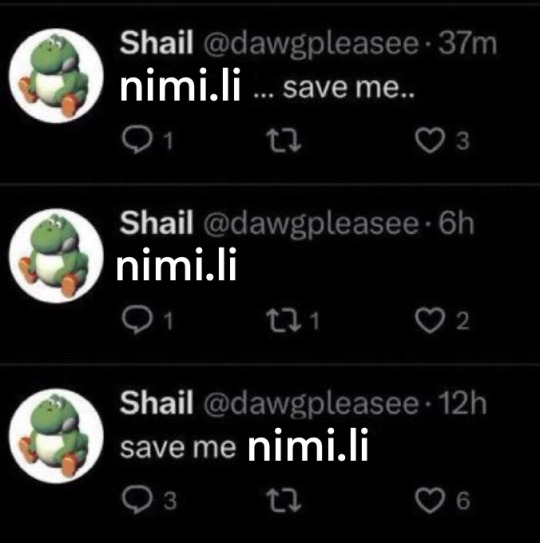
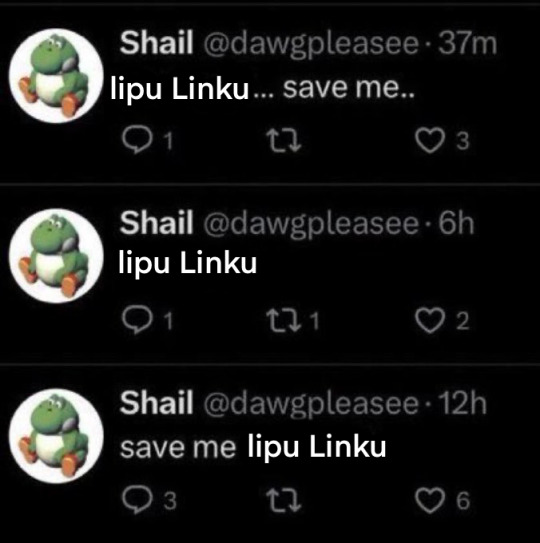
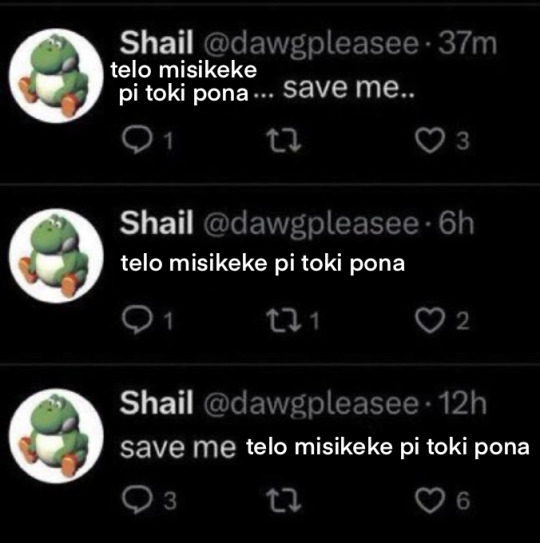
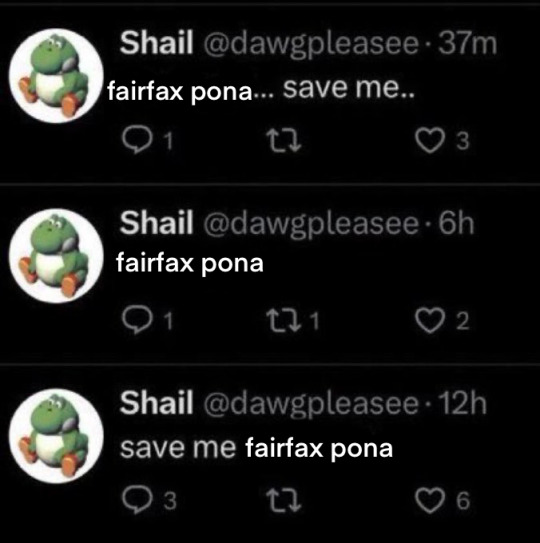
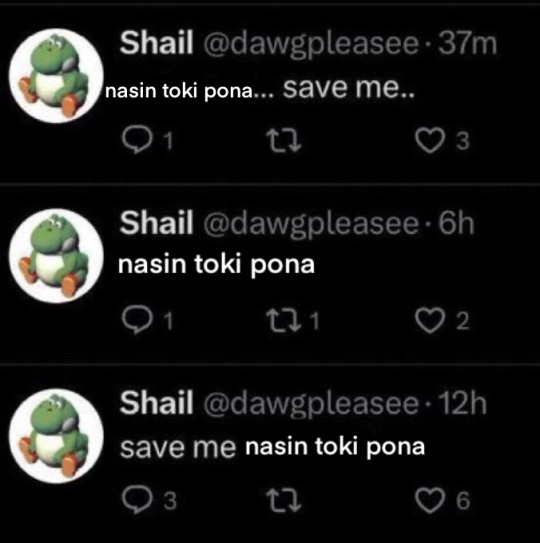
[ID: Five edited images of the "save me white girl" meme. 1: "nimi.li ... save me.. nimi.li. save me nimi.li." 2: "lipu Linku... save me.. lipu Linku. save me lipu Linku." 3: "telo misikeke pi toki pona... save me.. telo misikeke pi toki pona. save me telo misikeke pi toki pona." 4: "fairfax pona... save me.. fairfax pona. save me fairfax pona." 5: "nasin toki pona... save me.. nasin toki pona. save me nasin toki pona." End ID.]
nimi.li & lipu Linku - toki pona dictionaries
telo misikeke pi toki pona - a grammar checker
fairfax pona - a site to convert toki pona into sitelen pona
nasin toki pona - a grammar guide for toki pona that i personally found to be helpful
#felixlupin.txt#soweli Lupin li toki#toki pona#conlang#language#toki posting#toki pona resources#save me white girl#feel free to add your own resources that you found helpful
9 notes
·
View notes
Text
Star Wars: Republic Commando Soundtrack (2005)
My best try at transcribing the songs into IPA. If you find mistakes, please tell me.
Vode An (Brothers All)
Kote! -> /kote/
Kandosii sa kaʻrta, Vode an. -> /kantosiː sa kaʔrota | vote an/ Coruscanta aʻden mhi, Vode an. -> /korusanta aʔden mi | vote an/ Bal kote, darasuum kote, -> /bal kote | darasuːm kote/ Jorsoʻran kando a tome. -> /ʝorsoʔran kanto a tome/
Graʻtua cuun hett su dralshyʻa. -> /graʔtua kun het su dralʃiʝa/ Aruetyc talyc runiʻla trattokʻo. -> /aru.etak talak runiʔla trattokʔo/ Sa kyrʻam nau tracyn kad, Vode an. -> /sa kyrʔam naʊ̯ tra.ʃyn kad | ˈvote an/
Kandosii sa kaʻrta, Vode an. -> /kantosiː sa kaʔrota | vote an/ Coruscanta aʻden mhi, Vode an. -> /korusanta aʔden mi | vote an/ Bal kote, darasuum kote, -> /bal kote | darasuːm kote/ Jorsoʻran kando a tome. -> /ʝorsoʔran kanto a tome/
Motir caʻtra nau tracinya. -> /motir kaʔtra naʊ̯ tra.sinʝa/ Graʻtua cuun hett su dralshyʻa. -> /graʔtua kun het su dralʃiʝa/ Aruetyc talyc runiʻla solus cet oʻr -> /aru.etak talak runiʔla solus set oʔor/
Motir caʻtra nau tracinya. -> /motir kaʔtra naʊ̯ tra.sinʝa/ Graʻtua cuun hett su dralshyʻa. -> /graʔtua kun het su dralʃiʝa/ Aruetyc talyc runiʻla trattokʻo. -> /aru.etak talak runiʔla trattokʔo/ Sa kyrʻam nau tracyn kad, Vode an. -> /sa kyrʔam naʊ̯ tra.ʃyn kad | ˈvote an/
[Prologue] [The Egg Room]
Graʻtua Cuun (Our Vengeance)
Motir caʻtra nau tracinya. -> /motir kaʔtra naʊ̯ tra.sinʝa/ Graʻtua cuun hett su dralshyʻa. -> /graʔtua kun het su dralʃiʝa/ Taung! -> /tɔːŋ/
Motir caʻtra nau tracinya. -> /motir kaʔtra naʊ̯ tra.sinʝa/ Graʻtua cuun hett su dralshyʻa. -> /graʔtua kun het su dralʃiʝa/ Aruetyc runiʻla solus cet oʻr prudii an -> /aru.etak runiʔla solus set oʔor prudiː an/
Motir caʻtra nau tracinya. -> /motir kaʔtra naʊ̯ tra.sinʝa/ Graʻtua cuun hett su dralshyʻa. -> /graʔtua kun het su dralʃiʝa/ Aruetyc talyc runiʻla solus cet oʻr -> /aru.etak talak runiʔla solus set oʔor/
Motir caʻtra nau tracinya. -> /motir kaʔtra naʊ̯ tra.sinʝa/ Graʻtua cuun hett su dralshyʻa. -> /graʔtua kun het su dralʃiʝa/ Aruetyc runiʻla trattokʻo. -> /aru.etak runiʔla trattokʔo/ Sa kyrʻam nau tracyn kad, Vode an. -> /sa kyrʔam naʊ̯ tra.ʃyn kad | ˈvote an/
Motir caʻtra nau tracinya. -> /motir kaʔtra naʊ̯ tra.sinʝa/ Graʻtua cuun hett su dralshyʻa. -> /graʔtua kun het su dralʃiʝa/ Taung! -> /tɔːŋ/
Bal kote, darasuum kote, -> /bal kote | darasuːm kote/ Jorsoʻran kando a tome. -> /ʝorsoʔran kanto a tome/ Sa kyrʻam nau tracyn kad, Vode an. -> /sa kyrʔam naʊ̯ tra.ʃyn kad | ˈvote an/
[Improvised Entry] [They Must Be Asleep] [The Ghost Ship]
Darasuum Kote (Glory forever)
Kote, darasuum kote. -> /kote | darasuːm kote/ Te racin kaʻra juaan kote. -> /te ra.sin kæʔra | ʝu.aːn kote/
Kaʻrta Tor (One Heart of Justice)
Kandosii sa kyrʻam ast, -> /kantosiː sa kyrʔam ast/ Troan teroch jetiise aʻden, -> /tro.an terot | ˈdʒɛtiːsi aʔden/ Duraan vi at araʻnov. -> /duraːn vi at araʔnov/ Vode an, kaʻrta tor. -> /ˈvote an | kaʔrota tor/ Kote. -> /kote/
[Com Interference] [The Jungle Floor] [RV Alpha] [Through The Canopy]
Dha Werda Verda (Rage Of The Shadow Warriors)
taung sa rang broka -> /taʊŋ sa raŋ broka/ jetiise ka'rta -> /dʒe|tiː|sika|rota/ dha werda verda'b a'den tratu -> /ta|ver|ta|ver|tab|aten|tratu/ Coruscanta kandosii adu. -> /ko|ru|santa|kan|to|siː|atu/ Duum motir ca'tra nau tracinya a -> /dumo|tir|ka|tra|naʊ|traʃinʝa/ gra'tua cuun hett su dralshy'a -> /gra|tu'a|kun|het|su|dralʃiʝa/
ka'rta tor -> /ka'ro'ta'toːr/ kom'rk tsad droten -> /komuː|urok|tsatuː|udroten/ troch nyn ures adenn -> /to|rok|nin|uriːsu|uː|aten/ dha werda verda'b a'den tratu -> /ta|ver|ta|ver|tab|aten|tratu/ Coruscanta kandosii adu. -> /ko|ru|santa|kan|to|siː|atu/ Duum motir ca'tra nau tracinya a -> /dumo|tir|ka|tra|naʊ|traʃinʝa/ gra'tua cuun hett su dralshy'a -> /gra|tu'a|kun|het|su|dralʃiʝa/
I used this youtube video as source.
21 notes
·
View notes
Text
frustrating how so many craft books have a section about "how to sell what you've made"
like on one hand i get it because the person writing the book has obviously made their craft a full-time job. and they might have some tips and tricks that might be useful, and there are people out there who might be trying to start a small business out of it
but on the other hand it's just exhausting and feels like another voice saying "what's the point of having a hobby if you're not going to monetize it"
#the one of those that rly boils my blood. that i still think about all the time. almost ten years later#the art of language invention by david peterson lmao. fuck that. it is NOT actually a helpful resource if youre trying to get into conlang#in the intro he pretty explicitly was like 'yeah i'm only writing this bc the publishing house approached me bc#i made up some languages for the game of thrones show and that's popular so they thought it would sell'#the meat of the book itself is pretty rudimentary stuff iirc. 'here's the ipa chart. this is what a morpheme is.'#some cool stuff in there about how to build your own font and mess with the kerning to make cursive but it was a program i dont have so#and at the end. hoooooo boy. this is where u can tell they told him to put in this kind of section bc he basically straight up said#'if you're reading this because you want to learn how to build a fantasy conlang dont bother :)#if you weren't on this specific forum in 2002 youll never get it. just hire a Real Conlanger instead'#like. that absolutely colored the rest of the book preceding it bc the entire thing was stuff i had literally just learned#in the intro to linguistics class that inspired me to want to learn how to make a language. so it was nothing new#and the added antagonism of basically saying 'if you dont already know how to do this IM not gonna help bc you'd be competition'#again i understand why he had that attitude bc that's probably how the publisher pitched it in the first place#'this is going to be a book for the average joe who knows nothing about language mechanics and might have aspirations#of writing a story with its own language (because obviously gameofthrones was the first to do that /s) and is wondering how to do it'#but just a very weird attitude to have#mine
2 notes
·
View notes
Text
Useful for when one wants to create alien conlangs.
#not my writing#conlanging#language construction#language creation#conlanging resource#link#useful#resource
0 notes
Text
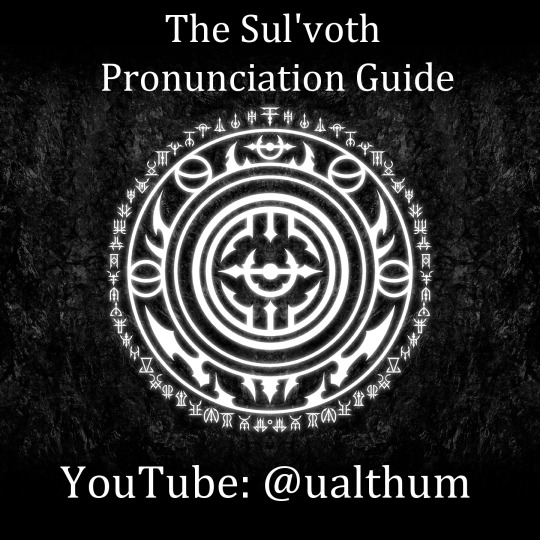
Friendly reminder that the newly edited version of the pronunciation guide is live on my YouTube page. Hear the runes in their clearest forms and feel the presence of Sul'voth.
#art#magick#magic#sorcery#witchcraft#runes#artists on tumblr#occultism#spirituality#sigil#conlang#language#linguistics#design#fine art#contemporary art#youtube#resource#free
27 notes
·
View notes
Text
A treat for y'all, because I like to dwell there:
#conlangcrab#conlanging#resource#conlangcrab talks#linguistics#tolkien#quenya#eldamo#sindarin#telerin#noldorin#elvish languages
4 notes
·
View notes
Text

A new conlang, dubbed Devil Speak, that I've been working on for The Living & the Dead. Looks a little disorganized because I am a disorganized person 😂
English text by @john-childerass 🥰
4 notes
·
View notes
Text
Wanted to add on a piece for people who were in the Esperanto course on Duolingo like me! Lernu!: Lernu is a great site for learning Esperanto if anybody wanted to! It's a multilingual resource as well, I'm not too sure which languages it supports while learning, however.
Duolingo Sucks, Now What?: A Guide
Now that the quality of Duolingo has fallen (even more) due to AI and people are more willing to make the jump here are just some alternative apps and what languages they have:
"I just want an identical experience to DL"
Busuu (Languages: Spanish, Japanese, French, English, German, Dutch, Italian, Portuguese, Chinese, Polish, Turkish, Russian, Arabic, Korean)
"I want a good audio-based app"
Language Transfer (Languages: French, Swahili, Italian, Greek, German, Turkish, Arabic, Spanish, English for Spanish Speakers)
"I want a good audio-based app and money's no object"
Pimsleur (Literally so many languages)
Glossika (Also a lot of languages, but minority languages are free)
*anecdote: I borrowed my brother's Japanese Pimsleur CD as a kid and I still remember how to say the weather is nice over a decade later. You can find the CDs at libraries and "other" places I'm sure.
"I have a pretty neat library card"
Mango (Languages: So many and the endangered/Indigenous courses are free even if you don't have a library that has a partnership with Mango)
"I want SRS flashcards and have an android"
AnkiDroid: (Theoretically all languages, pre-made decks can be found easily)
"I want SRS flashcards and I have an iphone"
AnkiApp: It's almost as good as AnkiDroid and free compared to the official Anki app for iphone
"I don't mind ads and just want to learn Korean"
lingory
"I want an app made for Mandarin that's BETTER than DL and has multiple languages to learn Mandarin in"
ChineseSkill (You can use their older version of the course for free)
"I don't like any of these apps you mentioned already, give me one more"
Bunpo: (Languages: Japanese, Spanish, French, German, Korean, and Mandarin)
#learning resources#study resources#languages#language#learning apps#langblr#learning languages#language resources#studyblr#language apps#Esperanto#conlangs#conlang
78K notes
·
View notes